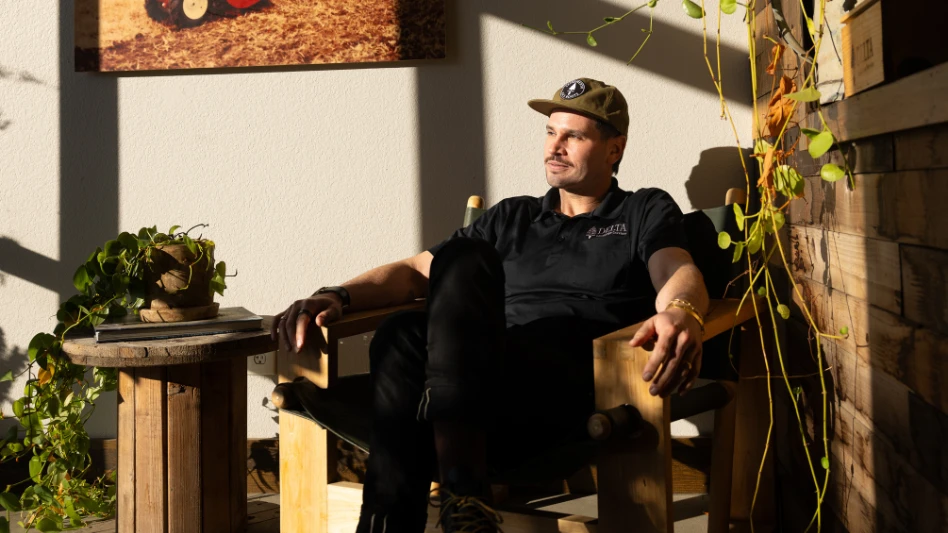
Photo: Kevin Fiscus

After 72 hours of no shuteye, Paul Voresis collapsed in the kitchen, a water glass in his hand shattered, half of his face drooped with neuropathy and his wife Rusti Voresis called 911. Paul was unconscious for the better part of five days, in a coma that doctors told Rusti could leave her husband with severe brain damage. Survival was highly questionable.
And that doesn’t even begin to describe the professional challenges before the medical emergency.
First, there was a sudden takeover of the business following a patriarch’s death — without a financial tutorial or business 101 lesson. There was a case load of complex commercial installation works-in-progress. Making payroll wasn’t a given for sure. Then came a decision to turn off a 40-year cash-flow valve of sustaining revenue.
Fair to say, the best and worst times staged an unofficial business bootcamp during the last dozen years at Delta Landscape Services in Sacramento, California. And in 2024, the family-owned operation posted a record revenue year, closing out at $5.2 million.
Sometimes a reset button is what you need.
‘We only got $300 today’
“And we need $5,000 to make tomorrow work,” Rusti told her husband, Paul, after a daily visit to the P.O. Box in hopes of finding payment from contractors.
It was 2012 and Paul had just lost his father and the company’s founder, Nick, after a yearlong cancer battle. Nick immigrated from Greece in 1976 and started the business four years later, bringing with him grassroots horticultural knowledge after working in olive orchards to help subsidize his family’s income.
Nick sowed a pathway toward providing for his family, and by the time Paul came along in 1982, a business legacy was born.
Except Paul wasn’t so sure at first.
“I grew up on jobsites doing commercial installation,” he says, acknowledging he was probably a resentful teen. But he, too, found deep satisfaction in executing plans in the field, collaborating with crew members and the rewards of a hard day’s work.
“Give me a set of plans, and I’ll knock out the job,” Paul says. “I didn’t know the business, and that came to a head immediately after my father’s passing to a degree where there were about 90 days when I thought we weren’t going to make payroll. I was doing what I knew how to do, which was get jobs done. Dad wasn’t there, and I was paying vendors but not billing clients.”
A project manager called Paul and said: “I haven’t received a single progress billing. What are you doing?”
Paul says, “A light bulb went off: Wow, no one is sending out bills. Things started crashing pretty quick, we got that bill out and turns out it takes an average of nine weeks to get paid, so that was a valuable lesson.”
Every day, his now wife Rusti would check the P.O. box in hopes of payment. She had come on board full-time to handle administrative affairs.
The couple worked through it and had a timely windfall of sorts. “Good things in life also kept happening,” says Rusti. When they received a phone call that an unknown bank account of Paul’s father had been recovered with enough to pay employees.
But some of the team also became a pain point.
“Everyone in the field was extended family to me, and after my father passed, I was like, ‘We got this,’” Paul says. “But not only did I not know how to run the financials, this was a team my father put together. Not my team.”
They were chummy, sure. But many crewmembers didn’t carry the same level of respect for Paul as they did for his father. “It was a whole different dynamic,” Paul says of their management styles, with the late Nick’s more tough love approach vs. Paul’s “in this together” mentality. “My dad always had people’s backs,” he emphasizes.
Some employees trickled to other opportunities; others simply didn’t perform in the field.
Then Paul brought in a new CPA, Burt Douglass, in late 2013. “He was my saving grace,” Paul says. “He started teaching me about business, I started making some new hires, getting in front of cash flow and kept bidding construction jobs.”
By 2016, the business was taking off and Paul was also growing the smaller maintenance side of the operation, which his father opened in 1989 as a solution for commercial install customers who wanted his team to stay on their properties to carry out mowing, blowing and trimming.
“Maintenance is an annuity,” Douglass told Paul.
Again, he saw the light and then hired an account manager to gain traction in maintenance while still bidding and winning large-scale installation projects that involved rollcalls of subcontractors. But the flavor of this work had changed drastically since his growing-up years in the industry and prior to the Great Recession.
‘This just doesn’t feel right’
“When I grew up, we worked with the same vendors and we navigated these jobs together as a family,” Paul says of a high level of trust across suppliers and skilled trades.
But after the 2007 to 2009 fallout, bidding shifted to “lowest of three numbers,” Paul describes. “I could play the game, but it was a paradigm shift.”
Still, Delta Landscape Services continued in a “beat up your subs” environment and by 2019, the service breakdown was 65% commercial install with the rest maintenance, mainly on those installs. It recorded its biggest year since 1980: $4.6 million and 32 employees.
But, Paul conceded, “This just doesn’t feel right.”
In 2017, he and Rusti welcomed their first son, Niko. By November 2018, their twin daughters, Devin and Drew, were born. While an office pack-in-play worked for one, Rusti returned home to care for their trio, and they hired an administrator to manage her duties.
“Paul couldn’t sleep, he’d be up pacing the bedroom, and we thought it was just stress,” Rusti says.
He really wasn’t feeling right.
“I was running myself thin,” he says of being away from family, racing to jobsites and building up the business. “I didn’t like the standard of living. It didn’t feel sustainable.”
He weighed whether to bring in more staff to support office and field operations or be honest about how he really felt in the modern commercial installation space.
The headaches in 2020 were persistent, he grew excessively fatigued. “Eight cups of coffee into the day and I’m still exhausted.” Stress was the excuse.
“I’m tired because I’m working so hard,” he wagered.
And this is the point where Paul collapses.
Amid COVID-19, Rusti was not permitted into the intensive care unit. After several days, she finally saw her husband. He had undergone surgery to remove a tumor under his brain that was pressing on his pituitary gland, which controls the body’s hormones. One of those is salinity, and Paul was desperately low on salt reserves and essentially crashed into a stroke that snowballed into coma.
Meanwhile at the business, Rusti took the reins. “We needed it to keep rolling, so I had the head of production step up, and everyone there did,” she says. “Everyone helped out.”
After surgery and another couple of days, Paul awoke.
The successful surgery allowed for natural recovery within nine months and full restoration. A miracle, if you believe. Paul re-evaluated his lifestyle. “Quite frankly, I almost lost my life,” he says. “And I felt that commercial installation was becoming life or death. If I kept doing it, I would literally be killing myself.”
Fortunately, a year before the medical incident, Delta Landscape Services started issuing higher-priced bids at RFP tables. This slowed commercial installation by about 15% while Paul maintained staff, shifting some to maintenance while mounting efforts to grow this division.
By January 2021, the company stopped bidding on all installation projects. It continued transitioning crewmembers to maintenance, which sometimes did not work, but installation was intentionally drying up.
The last installation project wrapped up in September 2021, and the company had then lost 65% of its revenue stream. January 2022 marked a milestone: the first year since 1980 when absolutely no revenue came from commercial installation.

‘This is the life I was after’
“We felt it,” Paul says of dipping from $4.7 million to about $3.8 million, which was bolstered by some pandemic Paycheck Protection Program (PPP) funds.
While the modest existing maintenance division had clients and there was some “light awareness” in the market, Paul says, there was work to be done. While serving commercial installation clients, Delta Landscape Services carried a hunk of cash flow to front the bills for materials and labor before getting paid for progress. “We built up a lot of cash flow over the years to keep that going, and we did that very well,” Paul says.
But maintenance’s financial requirements are totally different. “When cash came in that we didn’t have to carry on our books, we invested it in a management team and maintenance operations,” Paul says.
Also, the business sold off heavy-duty equipment it didn’t need for commercial maintenance and purchased more trucks, trailers, mowers and hand-held equipment. Paul engaged in an industry business consultant to learn more maintenance business fundamentals, started attending industry trade shows, adopted a robust software platform and engaged in a peer business group.
All the metrics, all the decision-informing data — “All of this really opened my eyes,” he says.
Paul also got real with his strengths and shortfalls as a leader.
“I’m not good at managing the office,” he says. “It’s not my strong suit.” Linda Cardenas joined the team as vice president and says Paul’s contagious, inspiring energy fuels the vision.
He’s ideas, she’s process.
“I know what it takes to move the needle from $5 to $10 million and beyond because that is my experience,” she says of a previous position in the industry.
Cardenas’ role centers on structure, systems and strategic planning.
Now, the company has a customized budget for every single maintenance client. “We never want to oversell a client, and we also want to make sure we are offering services they need by providing a comprehensive budget,” she explains.
The company launched its first electric-only crew. “When we talk to clients about the future, they see how we are invested and are in it for the long haul,” Cardenas says.
Paul says, “We’ve started building this and unlocking this next level. This is where it gets fun.”
Retention is high. Those who peeled away are returning because they couldn’t find a better culture somewhere else. “We’re going to keep it that way,” Cardenas says.
Ultimately, the business is in a second-generation iteration of what its founder Nick had established as ideals for success: relationships, good people, hard work and humility.
“This whole company has become way bigger than me or my father — it’s becoming a brand that is recognized for its great culture and quality, sustainable services, and people want to join us and be part of this,” Paul says. “Our trajectory and the impact we are having on our local marketing, the community and the industry is more rewarding than any check I’ve ever gotten.”

Explore the February 2025 Issue
Check out more from this issue and find your next story to read.
Latest from Lawn & Landscape
- Bartlett Tree Experts gave away 50,000 tree seedlings for Arbor Day
- Connect, Control & Conserve with Horizon Technical Services
- Use Horizon's Parts Hotline
- How I built a Top 100 company
- Horizon’s Exclusive TurfGro Fertilizer
- Grow your business with mosquito control
- LandCare adds 2 branches in SoCal, promotes Aleman to branch manager
- Spray them away





